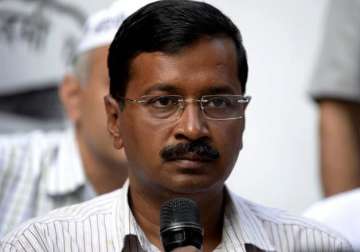Why is Arvind Kejriwal always on the warpath?
Unlike the customer, the voter is not always right. His choice can sometimes be a recipe for disaster. One example was the election of Lalu Yadav's party in Bihar in 1990 which led to 15

Unlike the customer, the voter is not always right. His choice can sometimes be a recipe for disaster. One example was the election of Lalu Yadav's party in Bihar in 1990 which led to 15 years of a nightmare of rampant lawlessness.
More recently, Mamata Banerjee's promised ‘parivartan' (change) in West Bengal hasn't made any difference to the intimidating cadre raj of ruling parties which began when the Marxists were in power. In both Bihar and West Bengal, the voters misread a leader's capabilities or offered support because there was no alternative.
The first possibility is seemingly responsible for Arvind Kejriwal's election in Delhi. Yet, there have always been doubts about his capabilities not only because he ran away from the battlefield after a 49-day stint in power in 2013-14 but also because his penchant for theatrics rather than for responsible governance has been evident ever since he sat on a “dharna” when he was the chief minister earlier and proudly declaring that he was “an anarchist”.
Although his first speech as chief minister after assuming office for the second time indicated that he might have matured to some extent since he promised to eschew arrogance and sought the Almighty's blessing to achieve this objective, his innate hauteur soon made itself felt.
The result was the hounding out of two leading members of the Aam Admi Party (AAP), Yogendra Yadav and Prashant Bhushan, from the party and the unceremonious ouster of the organization's internal Lokpal, Admiral L. Ramdas. Evidently, Kejriwal was clearing the decks for the exercise of untrammelled authority.
This desire for silencing all naysayers was also evident in his announcement in favour of the public trial of media personnel who crossed him. In 2013, too, Kejriwal had wanted to send those associated with the Fourth Estate to jail for, according to him, they were all “sold out” and rarely revealed the “true story” of Gujarat.
It was only a question of time, therefore, before his inborn intolerance found other targets like an IAS officer, whom he publicly accused of being hand in glove with the power companies, and Delhi's Lt Governor Najeeb Jung, who has been charged with being both the Congress and the BJP's stooge at different times.
Irrespective of the constitutional intricacies of the respective powers of the Lt. Governor and the chief minister, the central point is why is Kejriwal always on the warpath. Is it a personality kink, similar to the tantrums of a spoilt child? Or, is he driven to take on all and sundry by a sense of insecurity which makes him see conspirators everywhere? Or, does his anarchic instincts make him incapable of accepting the rules and regulations under which he has to work?
Whatever the explanation, Kejriwal's conduct on two successive occasions as chief minister has underlined his temperamental inadequacies for high office notwithstanding the faith he inspires among the underprivileged about his anti-corruption credentials.
But if he is really fighting for Delhi's full statehood, he has done his own cause a disservice by his querulous behaviour. Kejriwal's irresponsibility is the best reason why the status quo in Delhi should not be disturbed.
The support he has received from politicians like Bihar Chief Minister Nitish Kumar may have more to do with a desire to upstage the central government's nominees in Raj Bhavans than an appreciation of the ground realities in the national capital.
The constitutional provision, which puts Delhi in a special category under the National Capital Territory Act of 1991, denying it full statehood, appears to have been based on an unarticulated belief that the location of central establishments - parliament, the Supreme Court, the offices and residences of the president and the prime minister, and the various ministries and embassies - cannot be under a dispensation which may have unsettling political overtones.
The latest events have substantiated these fears. Although other chief ministers of Delhi have also pleaded for full statehood, their sobriety and maturity added weight to their demand. But Kejriwal's conduct has reinforced the prevailing apprehensions, especially in the context of bringing the police under the Delhi government.
Memories are still fresh about how one of Kejriwal's ministers during his 49 days in office wanted the police to raid a house inhabited by Africans who, the minister suspected, were guilty of immoral activities. The incident led to several African ambassadors calling on the chief minister to protest.
It has been suggested that the centre's jurisdiction over the national capital be restricted basically to what is known colloquially as Lutyens' Delhi. But misgivings will remain about handing over the policing powers to the state government, while having two police forces, one under the centre and the other under the state.
Although no party which is in power at the centre is immune to the temptation of using the police (and other institutions like the Central Bureau of Investigation) for its own purposes, the ascent to the national level invariably invests a party with an element of gravitas and a sense of responsibility.
Unfortunately, this isn't always true at the state level. Public faith in the impartiality of a state government is rarely absolute. In a way, single-party dominance is worse than a coalition because of authoritarian tendencies. The incarceration of a person who had posted a cartoon on the Internet in West Bengal is only one example of many such misuses of power. It is best, therefore, to leave Delhi alone for the present.